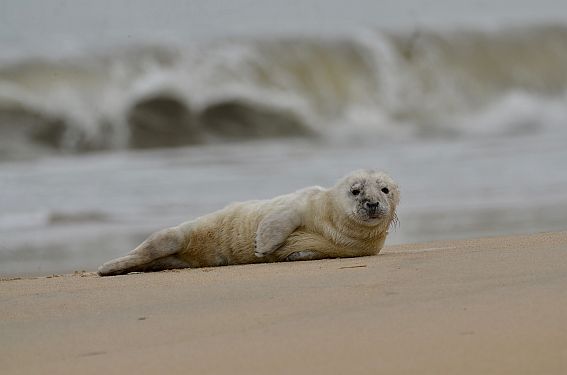Several Seal Pups Rescued by MERR Recently

The MERR Institute has responded to several very young seal pups along the shore in recent days – pups young enough that they can’t forage for food independently. MERR officials will provide adequate hydration and nutritional support until they are old enough to feed on their own. They’ll also be examined to determine any underlying conditions that might affect their health. On Saturday MERR rescued a young female gray seal at Cape Henlopen State Park – she was later taken to the National Aquarium in Baltimore for further rehab – and release.
Additional information from MERR Institute:
The team at the Marine Education Research and Rehabilitation (MERR) Institute has responded to a flurry of very young seal pups in the last few days. Many of them are still cloaked in their lanugo (the fluffy white coat that pups have while they are still nursing from their mothers). This fur indicates their young age and signifies that they are too young to forage for food independently.
Seal pups are vulnerable to attacks from the adult male seals on the colony, so bite wounds and other ailments that can lead to infection can occur.
Seal pupping in Delaware is a fairly recent occurrence, and may be the result of the developing seal colony off of Lewes. MERR does not typically respond to calls concerning pups on the beach until they are older and have been weaned, so this spike of dependent pup strandings in the last few days is unusual. “The cause may be linked to the flood tides during the past week, which could have washed the pups off of the rocks and into the bay and ocean,” said MERR Executive Director Suzanne Thurman.
If the public encounters a seal resting on the beach or elsewhere, please call MERR immediately at 302.228.5029, and keep a distance of 150 feet from the animal. Please keep dogs on a leash for the well-being of both the seal and the dog. Seals spend about half their lives on land, and will often exit the water to sleep. This rest is integral to their survival, regardless of their age, as females will often go for weeks without consuming food while they are nursing. Approaching seals closely not only frightens them but adds stress and may cause them to retreat into the water without the necessary rest.
The most common seals on Delaware beaches are Gray and Harbor seals. Gray seals can make low-frequency growls, throaty sounds, low-frequency clicks, and can make motions with their front flippers, whereas Harbor seals will bark, grunt, growl, or moan and make similar flipper gestures. Any exhibit of this behavior from a seal means it is feeling threatened, stressed, and therefore unable to sleep. MERR appreciates everyone’s help in keeping these seals safe.
For more information on seals or any other marine mammal or sea turtle that frequents Delaware waters, or for general information about MERR Institute, visit merrinsitute.org.


